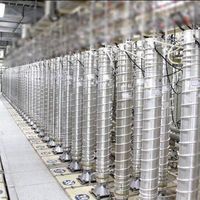Prominent Critic Calls On Raisi To Step Down Amid Economic Crisis
The editor of one of Tehran's leading pro-regime newspapers has called on President Ebrahim Raisi to step down if he cannot solve Iran's economic problems.
While rising bread prices have turned even some of Raisi's supporters against him, Massih Mohajeri, the editor of Jomhouri Eslami (Islamic Republic) newspaper who usually criticizes the administration's policies wrote in an editorial on Saturday, "Now that it has become clear that you cannot solve the problems, step down bravely and leave the job to those who can do it and save the people from this dangerous quagmire."
The editorial charged that "Media close to the administration label those who criticize you for the problems you have created as counter-revolutionaries who work for Israel and the United States." It went on to say that some of Raisi’s supporters are also protesting the government's policies.
Mohajeri further asked, "The president should say how much time does he need to understand that problems cannot be solved by just talking and the government cannot be run in this way." He added: "Blaming all shortages on smugglers is not a solution,” and if that is the problem, why the government does not stop them.
Ukraine and nuclear talks with the US
"If the problem of flour shortage is caused by the war in Ukraine, why you don’t condemn Russia's aggression against Ukraine and not try to stop Vladmir Putin from continuing the invasion, which threatens the livelihood of a major part of the world?" Mohajeri asked Raisi.
He also asked Raisi why he does not do anything to reach an agreement with the United States. "You said you will not tie the country's fate to the [nuclear] negotiations, but by not doing anything, you have created new problems for the nation."
Many in Iran know it is Supreme Leader Ali Khamenei who decides key foreign policy and other state matters, but semi-official media would not dare to blame the economic crisis directly on Khamenei.
Mohajeri addressed Raisi that "If the instability of the government and the current dangerous situation have not been created by infiltrators, then they must be attributed to the poor management of your economic ministers."
He reminded that the price of bread in Iran did not rise even during the war with Iraq in the 1980s. He warned that raising the price of flour and rationing bread are like setting fire to gunpowder. Further warning that there are several individuals affiliated with the deviant group [jargon referring to those close to former President Mahmoud Ahmadinejad], Mohajeri charged that these elements could be attempting to unseat the current government and asked Raisi to take this warning seriously.
Economic crisis main topic of media
On Saturday, most newspapers in Tehran which are usually silent about economic problems, covered the shortage of these items in extensive stories, although the government's own newspaper, Iran, and the hardline daily Khorasan claimed that people were happy about the situation and "over 62 percent of Iranians said they were happy about the government's performance in a poll that was conducted before the unusual bread price rise."
At the same time, Mostafa Hashemi Taba, a former presidential candidate, said in an interview published by Didban Iran website that "the Raisi Administration has totally lost its social capital." He said the government wants to be portrayed as a revolutionary government abroad, but it wishes to adopt liberal economic policies inside the country. He said there are only two solutions to the problem: Either the government should be able to distribute all of the people's needs, or it has to resort to rationing essential commodities.
Meanwhile, economist Hossein Raghfar told Khabar Online website that the government's policy over bread is not transparent. He dismissed the official statements about flour being smuggled out of Iran as "fabrication" and maintained that the problem is the falling value of the currency, which he said rose from 10,000 rials per dollar to 35,000 rials in 2011, and from 30,000 rials in Janyary 2018 to 320,000 rials in January 2021. He charged that rich people in power benefitted from all of these changes while they ignored the interests of the ordinary Iranians.







